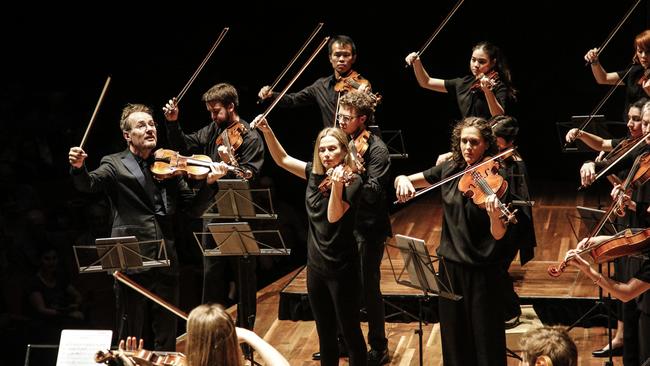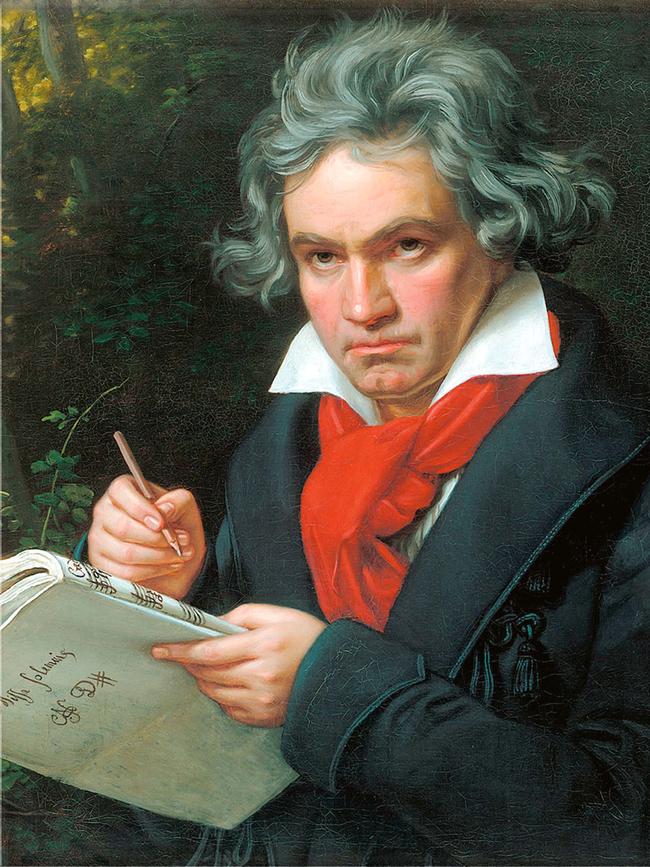Roll over Beethoven, cancel culture is coming for you
After pulling down statues and banishing fantasy authors, the world’s most popular composer is the next bogeyman.

After pulling down statues and banishing fantasy authors, cancel culture has caught up with classical music and is making a bogeyman of Beethoven, the world’s most popular composer.
This year was meant to be one of celebration for Beethoven, who was baptised (his exact date of birth is unknown) in Bonn on December 17, 1770. The pandemic has cancelled concerts of Beethoven’s music but that hasn’t stopped attempts by academic theorists and podcasters to bring him down a notch or two. Not so much a year of exciting performances of sonatas, string quartets and symphonies, it has been the year of cancel Beethoven.
His crime? For starters, he was white and a man. He is an exemplar of the European music tradition: the “common practice” that has colonised concert halls across the world. Seen through the lens of race and gender theory, his music dominates the concert repertoire because white-male privilege and assumptions about white-male genius keep him there.
Beethoven is inescapable because his titanic imagination remade almost every genre of concert music that matters. He unleashed the expressive power of the newfangled pianoforte. The concerto and symphony in his hands became driving musical narratives of heroic struggle. In the late string quartets he opens a profound window on to the soul.
Beethoven is described in these terms because of his superlative musical achievements — and that is why the anti-Beethoven brigade wants to bring him down. In one of the loopier utterances on the subject, Slate online rebukes Beethoven for his mononym: the fact he is known by a single name, like Michelangelo or Shakespeare. It gives the pedestal of nomenclature to “straight white men at the expense of everyone else”.

Melbourne composer and Yorta Yorta woman Deborah Cheetham says the idea of cancelling Beethoven is inflammatory and ridiculous. Earlier this year, Cheetham wrote a companion piece to Beethoven’s ninth symphony and translated the Ode to Joy into Yorta Yorta for performance with the Melbourne Symphony Orchestra.
She recognises Beethoven as one of the musical giants on whose shoulders successive generations of composers stand. “Beethoven is part of the legacy of the canon,” she says. “We do not need to cancel Beethoven to include more female composers, they are not mutually exclusive.”
Yet the attacks on Beethoven have had wide circulation. Musicologist Nate Sloan and songwriter Charlie Harding argue that Beethoven, or rather the veneration of his music, is responsible for the class-ridden, exclusionary practices of the concert hall: sit still, shut up, don’t clap until the end. In their podcast The Fifth, they discuss the opening bars of Beethoven’s fifth symphony, and the da-da-da-DUM motif that is one of the most famous sounds in all music. A conventional reading of this theme is that it represents the sound of fate knocking on the door, or that it’s Beethoven’s riposte to his encroaching deafness.
But Sloan and Harding contrive to turn this musical motto into the sound of the gate slamming shut on minorities, such as “women, LGBTQ+ people, people of colour”.
In the frontline of the academic debate about Beethoven is US music theorist Philip Ewell, who recently published an article called Beethoven was an Above-Average Composer — Let’s Leave it at That. He takes issue with the epithets routinely applied to dead white composers and their output such as “genius” and “masterwork”, which evoke slavery (master-slave) and sexism (master-mistress). To be fair, Ewell is not taking issue so much with Beethoven as with classical music’s “white racial frame” that reinforces the hierarchy of white male composers. “He (along with countless other white males) has been propped up by the white-male frame, both consciously and subconsciously, with descriptors such as genius, master and masterwork,” Ewell says.
That Beethoven is under siege from culture warriors on the left obscures the fact he was, for his era, a fairly progressive guy.
Beethoven believed passionately in liberty, equality and fraternity, and for a time thought of Napoleon as the guiding light of those ideals; he intended to dedicate his third symphony to him.
When Napoleon had himself crowned emperor, Beethoven struck out the dedication and renamed the symphony with a more generic title, Eroica (“heroic”). The ninth symphony and its Ode to Joy is stirring, triumphant music of a great humanity — not for the elite but for the “millions”.

As for Beethoven as an emblem of sexism and racism in music, two episodes of his life may dislodge the notion that he personally is to blame. Although he was disappointed in his romantic relationships and fought a bitter battle with his sister-in-law, he had enduring friendships with women. One of his best friends was Nannette Streicher, a pioneering piano-maker and businesswoman.
Another friend was virtuoso violinist George Bridgetower, who had mixed-race heritage: his father was from the West Indies. Bridgetower was the original dedicatee of a brilliant piece for violin and piano. Beethoven called it the “mulatto sonata” after his friend — a racist term but he evidently meant it affectionately.
The pair gave the first performance of the sonata but fell out soon afterwards, and Beethoven renamed the piece for another violinist, Rudolphe Kreutzer.
Richard Tognetti has long been fascinated by the story of Beethoven, Bridgetower and the work known as the Kreutzer Sonata. The artistic director of the Australian Chamber Orchestra, Tognetti will perform the sonata in concert next year, in his own arrangement for string orchestra, and he would very much like to rename it.
“I want to remember Bridgetower and the extraordinary story — in part because of his heritage as a biracial person, but I want to remember him as a violinist as much as I do his heritage,” Tognetti says.
Beethoven’s critics are not wrong that he dominates the repertoire. Sydney composer Ian Whitney has made an annual study of the music performed by Australian orchestras and the low rate of Australian content. Beethoven often is the most-performed composer in the repertoire and his anniversary year was no exception. Before the widespread cancellation of concerts — because of coronavirus, not culture wars — 15 to 20 per cent of the repertoire programmed by some orchestras was music by Beethoven.
There certainly is plenty of excellent and interesting concert music to listen to: by Australian composers, by women, by people whose racial heritage is not the same as Beethoven’s. But to cancel Beethoven because of his race or his sex is nonsense. His only crime is that he is popular.



